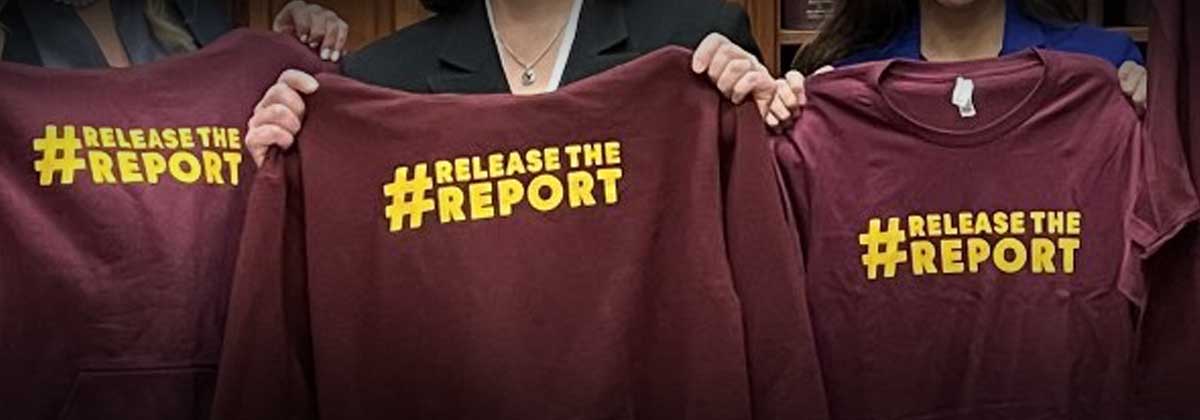By Barbara Dalton and Cathleen Watkins
Sexual harassment allegations in the newly named Washington Commanders NFL franchise have been a dynamic, evolving story that has been building since July 2020. During that summer, the Washington Post first published an account of sexual harassment within the Commanders’ organization and detailed the franchise’s failure to deal with the problem.
Last week, the Post published more coverage about the Commanders that hit on several areas of interest for investigators, including growing demand for the Commanders to release the investigative report addressing the allegations.
On Wednesday, the Post reported that the House Committee on Oversight and Reform convened a public “roundtable discussion” that included firsthand accounts of sexual harassment from six former employees of the franchise. According to the Post, the Committee acted after failing to receive information about the results of an investigation conducted by attorney Beth Wilkinson. You can find this Washington Post article here.
Wilkinson’s investigation concluded in the early summer of 2021. After allegations of misconduct were levied against the Commanders’ owner, Daniel Snyder, the NFL assumed supervision of Wilkinson’s work; the league issued a $10 million fine against the Commanders in July 2021. According to the NFL, it received only a verbal briefing from Wilkinson, and no written report was produced.
On Thursday, the Post reported on statements made by former Commanders employees appearing before the Committee. The former employees described instances of sexual harassment and sexual misconduct and raised what the Post described as “new allegations,” which included a detailed description of sexual harassment by Snyder. You can find this Washington Post article here.
Former employees spoke of “feeling betrayed” by the NFL not making Wilkinson’s findings public; one was quoted as saying the former employees participated in the investigation because they believed information about what had occurred would become public.
Both the former employees and Committee members called for the NFL to release a detailed report and Wilkinson’s findings. The head of the NFL was quoted citing “employees’ privacy rights” as the reason findings have not been disclosed. Snyder released a statement denying the accusations levied against him and denouncing them as “outright lies.” Pictures accompanying Thursday’s story showed a group of former employees wearing T-shirts and hoodies in Commanders’ colors with “#RELEASETHEREPORT” printed across the fronts. A picture of Committee member Rep. Gerald Connolly (D-VA) wearing the T-shirt appeared on Twitter.
On Friday, the Post reported that the Committee released a document showing that the NFL and Snyder had signed a “Common Interest Agreement” stating that neither would disclose information about the investigation without the other’s approval. The Committee announced a deadline of February 14 for the NFL to submit all documents related to the investigation, including the findings. In addition, the Committee released the engagement letter between the Commanders and Wilkinson’s firm, which stated that the firm would complete a written report of its findings. The Committee put forward that NFL Commissioner Roger Goodell “instructed Wilkinson to present him with an oral report rather than a written one” after the NFL began supervising the investigation. A lawyer representing former employees made a statement denouncing the investigation as “a fraud.” According to another news source, Adam Long TV, the NFL then released a statement asserting that some documents sought by the Committee came under attorney-client and work product privileges. You can find this Washington Post article here.
As these events involving the Commanders play out in the media, investigators might see similar situations in their own cases. In recent years, sexual harassment and misconduct in public-facing organizations have become matters of great public interest. Investigators working in this area should expect that their work will receive attention and scrutiny.
In addition, an organization’s decisions about how to proceed after an investigation has concluded can lead to even greater scrutiny of all aspects of the investigation, including the terms of the investigator’s engagement, why a written report was not produced, and questions about who controls information about the investigation. Investigators should be prepared for demands that findings, reports, and other information generated during an investigation be publicly disclosed, and a decision to withhold information may call an investigation’s integrity into question. Rationales for withholding information about an investigation may be probed and rejected.
A decision not to disclose the findings of an investigation can backfire spectacularly. Here, it led to additional, highly public investigations by the press and a group of elected officials. New allegations of sexual harassment and misconduct emerged, along with accusations that the original investigation was fraudulent. Lack of transparency led to more revelations and greater public attention. It is likely that the elected body will use attention paid to the Commanders investigation to garner support for legislative changes, such as prohibiting nondisclosure agreements in employment.
Finally, calls for the investigation’s findings and report to be publicly released turned the traditional investigative approach, which places a high value on confidentiality, on its head. This is part of a shift that has been taking place since the “Me Too” movement went viral in 2017, with accounts of sexual assault and harassment against public figures being widely publicized. “Me Too” in turn dovetailed with changes in collective views about privacy, and the growth of social media aligned with the increasing desire to narrate or document all aspects of daily life. These cultural developments surround the Commanders investigation at every turn. Investigators, take note.
Attorney/Investigator Barbara Dalton, Managing Partner at Public Interest Investigations (PII), regularly conducts investigations of sexual misconduct allegations in the public and private sector. She serves as a hearing officer for Title IX matters.
Cathleen Watkins is a senior investigator at PII. She is also a trainer and project director at T9 Mastered, an affiliate of PII that provides training to Title IX professionals on investigating and adjudicating campus sexual assaults.


